Adverse Childhood Experiences
(ACE)
Adverse Childhood Experiences (i.e. ACE) are traumatic experiences during childhood that have potentially harmful consequences in adulthood. Children experience trauma in various ways. They can have Big T traumas such as abuse and neglect and Little t traumas such as witnessing someone else’s trauma, a routine dental procedure, or negative interaction with a teacher. Whether they are big T or little t, ACEs leave a lasting impression.
Adverse Childhood Experiences
(ACE)
Adverse Childhood Experiences (i.e. ACEs) are traumatic experiences during childhood that have potentially harmful consequences. Children experience trauma in various ways. They can have Big T traumas such as abuse and neglect and Little t traumas such as witnessing someone else’s trauma, a routine dental procedure, or a negative interaction with a teacher. Whether they are big T or little t, ACEs leave a lasting impression.
This assessment will help you determine your ACE score based on Big T traumas.
When you have completed this assessment we will provide you with your result, what it means for you and your emotional wellness, and how you can make simple changes in your lifestyle that address your personal experiences.*
*You must be 18 years of age or older to take this survey. Please note questions within this survey address experiences related to trauma. Please take care in determining if this content will be disturbing to you in any way.
What We Know
“There are people with high ACE scores who do remarkably well,” says Jack Shonkoff, a pediatrician and director of the Center on the Developing Child at Harvard University.

What we do know is that individuals who experience more ACEs during their childhood are more likely to experience emotionally dangerous environments, a decrease in emotional and psychological boundaries and a clear disconnect from their emotions in order to survive.

The impact ripples through the rest of their lives leaving them attached to an atmosphere of high dissociation, avoidance tendencies, emotional unavailability to experience love, and you guessed it, unbearable emotional stress.
Let’s come back for a minute to the present day. We also know, perhaps more prevalent than ever, that our lives don’t have to STAY that way.
Collectively, children grow, connect, find empathy and compassion for themselves and others, creating whole lives, full of emotional allies as their guides to express the beauty they hold as adults.
We are all a product of our past…
Can We Change It?
As you can see, our early experiences shape who we are, and the most impactful experiences were the ones that come from stressful events when we were a child. Most of us have had one or more Adverse Childhood Experiences. And, the more ACEs we have, the worse the mental and physical health outcomes we are likely to experience.
In a study done by Kaiser Permanente and the CDC, it was found that those with a higher number of Adverse Childhood Experiences, or ACEs, were more likely to experience worse mental and physical health outcomes as adults. In that original study, they found that 67% of the population studied had at least one ACE. and 17% had 4 or more ACEs. Later researchers discovered that people with six or more ACEs had a twenty-year shorter life expectancy than those with no ACEs at all. These results have now been confirmed by a body of research over several decades. The results are clear.
It’s not all bad news though when we become aware of something that is affecting our health we can do something about it. Even if it means changing the past. There are a host of different techniques that can help us build emotional resilience, and that these techniques can decrease the negative consequences of these events later in life.
Having troubles and need support? Email Us: hello@rrest.com
